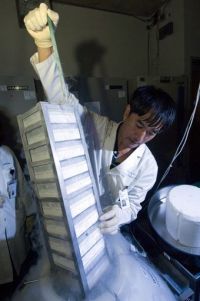New UT System Health Biobank to advance scientific discovery
AUSTIN – The University of Texas System is developing a biobank so that multiple UT institutions can more efficiently share data and biological samples used for medical research.
The UT System Health Biobank (UTSHB) will join the professional expertise and resources of seven large academic research and clinical institutions in the UT System: UTHealth in Houston, UT Health San Antonio, UT MD Anderson Cancer Center, UT Medical Branch, UT Southwestern, UT Health Northeast and UT Rio Grande Valley.
UTHealth, which already is established as a top national center of biobanking and biobank-related research, will lead the collaborative effort.
“Once in place, the UTSHB network will speed scientific discovery and translation of these findings into patient care, and will make the research of UT faculty more competitive for grant funding,” said Ray Greenberg, M.D., Ph.D., UT System executive vice chancellor for health affairs.
The UT System has dedicated $3.5 million to support the implementation of a biobank software platform. Three institutions will participate in a pilot phase of the initiative, and once complete, the remaining sites will be added.
This initiative is part of the UT Health Care Enterprise, one of nine “Quantum Leaps” designated by Chancellor William H. McRaven as part of the UT System vision to make Texas a stronger, smarter and healthier state. It’s also a direct response to McRaven’s charge to UT institutions to pursue collaborations and operate as a “team of teams” to better leverage the System’s collective size and expertise.
Many institutions already have biobanks and are determining how to work together to best utilize the biospecimens and data, said Jennifer Sanner, Ph.D., director of the UTHealth Center for Clinical and Translational Sciences (CCTS) Biobank and UTSHB project lead.
“By transforming multiple local biobanks into a cohesive and consistent system, researchers will be able to conduct research using larger sample sizes and data sets,” Sanner said. “The end result will be improved research effectiveness and quality, and faster translation of discoveries to directly benefit patients.”
Michael Laposata, M.D., Ph.D., professor and chairman of the Department of Pathology at UT Medical Branch, noted that UTSHB will help make samples from patients with even the rarest diseases available to multiple institutions.
“UTMB, for example, can build and share a sample collection of rare infectious diseases while expanding new areas of research excellence by using samples from diseases, such as cancer, that are collected largely from other UT institutions,” Laposata said.
Two UT System offices will jointly aid the institutions in this effort. The Office of Health Affairs will help with overall strategy and governance, while the Office of Shared Services will assist with the software implementation, financial reports and, over time, report on key performance measures.
Others involved in the UTSHB submission and award process were:
- Richard St. Onge, associate vice chancellor for shared services at UT System;
- BethLynn Maxwell, Ph.D., chief health research officer at UT System;
- Eric Boerwinkle, Ph.D., dean of UTHealth School of Public Health and senior co-director of CCTS Biobank;
- Lorraine Frazier, Ph.D., R.N., dean of UTHealth School of Nursing;
- Jeff Rando, project manager for the UTSHB initiative; and
- Megan Grove, principal laboratory specialist at UTHealth School of Public Health.
About The University of Texas System
Educating students, providing care for patients, conducting groundbreaking basic, applied and clinical research, and serving the needs of Texans and the nation for more than 130 years, The University of Texas System is one of the largest public university systems in the United States. With 14 institutions and an enrollment of more than 228,000, the UT System confers more than one-third of the state’s undergraduate degrees, educates almost two-thirds of the state’s health care professionals annually and accounts for almost 70 percent of all research funds awarded to public institutions in Texas. The UT System’s operating budget for FY 2017 is $17.9 billion, including $3 billion in sponsored programs funded by federal, state, local and private sources. With more than 20,000 faculty – including Nobel laureates and many members of the National Academies – and nearly 80,000 health care professionals, researchers, student advisors and support staff, the UT System is one of the largest employers in the state.
Background Materials
News Contact Information
Jenny LaCoste-Caputo: jcaputo@utsystem.edu • 512-499-4361(direct) • 512-574-5777 (cell)
Karen Adler: kadler@utsystem.edu • 512-499-4360 (direct) • 210-912-8055 (cell)
Melanie Thompson: mthompson@utsystem.edu • 512-499-4487 (direct) • 832-724-1024 (cell)


